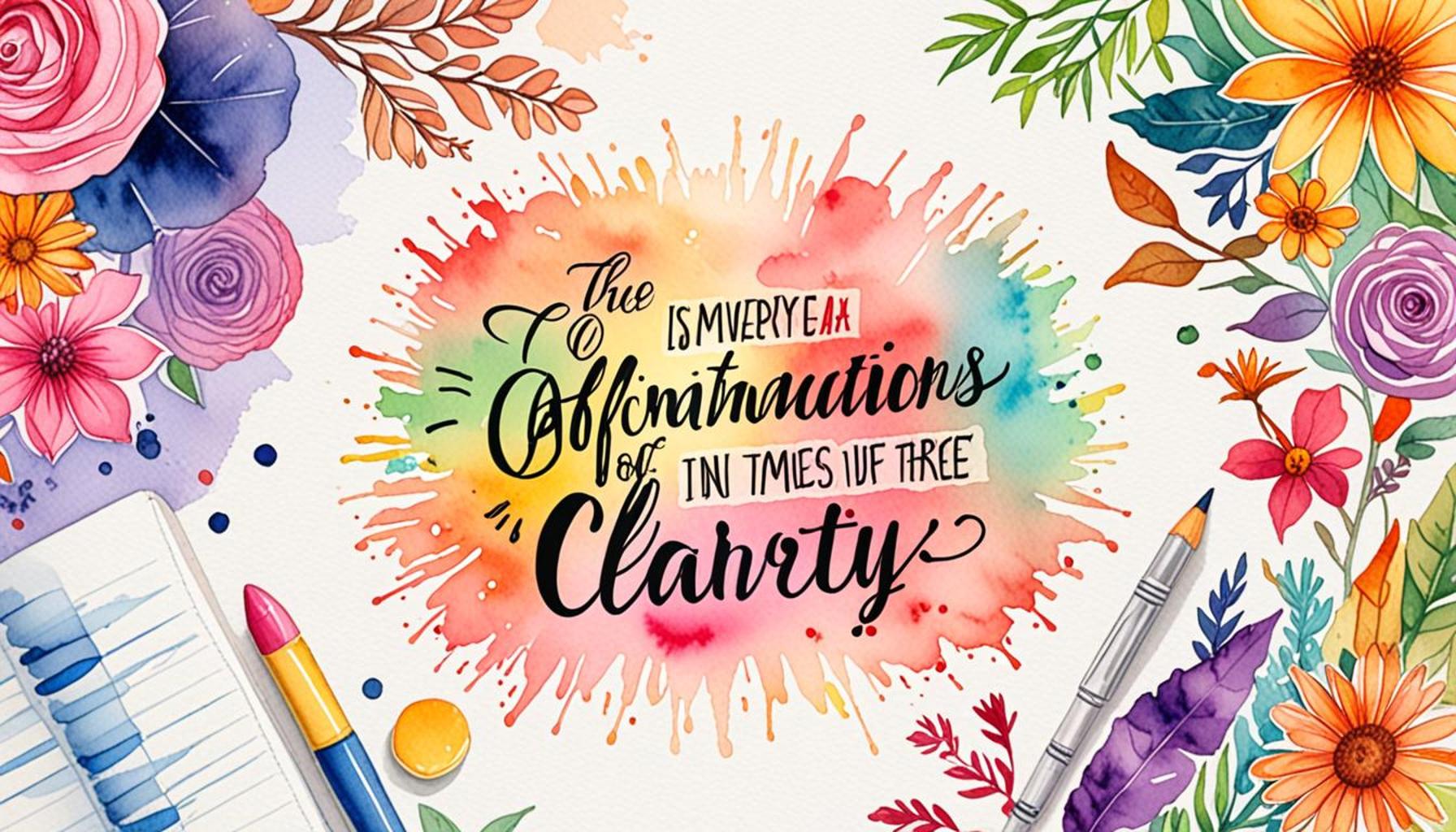The Role of Daily Affirmations in Improving Self-Confidence and Mental Clarity

The Transformative Power of Affirmations
In today’s fast-paced and frequently challenging world, finding tools that enhance our mental well-being is crucial. Daily affirmations emerge as a potent instrument for fostering self-confidence and refining mental clarity. These positive statements act as personal mantras, reminding us of our intrinsic value and potential, thereby assisting in cultivating an optimistic mindset.
Affirmations can profoundly reshape our daily experiences in various ways:
- Improved Self-Image: Inputs from our environment and society can often distort our self-perception. By consistently voicing affirmations like, “I am capable of achieving my goals,” individuals can significantly modify their self-image. This is particularly significant for younger generations who often face peer pressure and societal expectations.
- Reduction of Negative Self-Talk: Self-doubt can be debilitating, but affirmations counteract this negativity. Phrases such as “I am worthy of success” can help drown out the internal critic and diminish feelings of inadequacy often spurred on by social media comparisons.
- Enhanced Focus: Mental clarity is vital for achieving one’s aspirations. By regularly asserting one’s goals through affirmations, individuals create a mental environment conducive to focus and determination. This can be particularly useful for students preparing for exams in Nigeria’s competitive academic landscape, where the pressure to excel is immense.
Furthermore, in Nigeria, the cultural significance of affirmations resonates deeply with many. Traditional proverbs, rich in wisdom, serve a similar purpose by instilling confidence and asserting one’s rightful place in society. For instance, sayings like “a bird that perches on a tree does not fear the fall” encapsulate the essence of resilience and self-belief, which can be seen as an early form of affirmation.
Contemporary figures in motivational speaking, such as Fela Durotoye and others, have amplified this message, integrating affirmations into their talks to inspire the masses. Through their emphasis on positivity, they resonate with a diverse audience, asserting that everyone has the power to rewrite their narrative.
As we explore the efficacy of daily affirmations, it is essential to comprehend how they function on a psychological level. Repeating affirmations helps rewire neural pathways, fostering a mindset geared toward success and self-acceptance. This shift can lead to significant life changes, encouraging individuals to embark on journeys of personal and professional growth.

Thus, by embracing the practice of daily affirmations, individuals can not only bolster their self-image but also cultivate clarity in their goals, unlocking pathways to realize their utmost potential amidst life’s challenges. This practice is not merely about positive speaking; it is an empowering tool designed to reshape our internal narrative and inspire action toward fulfilling our dreams.
LEARN MORE: This related article may interest you
Unlocking the Mind: The Mechanisms Behind Affirmations
The journey towards enhanced self-confidence and improved mental clarity through daily affirmations unfolds through both conscious intention and subconscious influence. When individuals engage in the practice of affirming their strengths and aspirations, they tap into a fundamental psychological principle: our thoughts shape our realities. This connection is not simply anecdotal; various studies highlight how affirmations can stimulate brain activity related to self-referential processing, thus reinforcing a positive self-image.
According to psychology experts, affirming positive qualities can lead to changes in how we perceive ourselves and how we engage with the world around us. This is especially important in Nigeria’s dynamic socio-cultural landscape, where societal expectations can exert considerable pressure on individuals, particularly the youth. Many young Nigerians navigate a maze of identities, balancing traditional values with modern aspirations. By embracing daily affirmations, they can cultivate a sense of agency and self-directedness, empowering them to pursue their dreams unabashedly.
To better understand the impact of affirmations, consider the following mechanisms:
- Neurological Reprogramming: Repeatedly asserting positive statements can lead to the formation of new, positive neural pathways. This neurological reprogramming is crucial in shifting the mindset from self-doubt to self-empowerment.
- Emotional Resilience: Daily affirmations not only build self-esteem but also create emotional buffers against life’s inevitable challenges. Whether it is managing exam stress or dealing with workplace pressure, a strong affirmation practice offers practical relief.
- Enhanced Mindfulness: Incorporating affirmations into daily routines fosters a heightened sense of awareness. This mindfulness leads to clearer thinking, enabling individuals to make better decisions, especially in high-stress situations.
The ripple effects of these mechanisms can be profound. For instance, academic performance can significantly improve as students gain clarity and confidence during critical examinations. In Nigeria’s educational environment, where competition is fierce and expectations are high, this psychological boost can provide students a much-needed edge. Furthermore, professionals navigating the bustling job market can utilize affirmations to reinforce their capabilities, fostering an atmosphere where creativity and confidence thrive.
Moreover, globally recognized motivational strategies advocate incorporating affirmations into daily routines, emphasizing a communal approach. Across various Nigerian communities, mentorship programs and peer support groups encourage young people to share and empower each other with affirmations. This collective reinforcement amplifies the efficacy of affirmations, resulting in transformed mindsets and greater achievements.
Thus, as we delve deeper into the transformative potential of daily affirmations, it becomes clear that this simple yet powerful practice holds the key to unlocking self-confidence and mental clarity in our personal and professional lives. The journey is not merely about words; it is about cultivating a profound belief in oneself and radiating that strength into every pursuit.
| Benefits of Affirmations | Key Characteristics |
|---|---|
| Enhances Self-Confidence | Daily affirmations help in reshaping negative beliefs and instilling confidence. |
| Improves Mental Clarity | Affirmations encourage focus and mental organization, enabling clearer thoughts. |
Daily affirmations serve as a powerful tool in the journey to enhance both self-confidence and mental clarity. By actively engaging in this practice, individuals can address and dismantle the barriers created by negative self-talk. The act of speaking affirmations aloud fosters a sense of empowerment and can transform thought patterns, creating a more positive self-image. Moreover, daily affirmations can streamline cognitive processes, allowing for better decision-making and improved problem-solving skills. The repetition of positive statements influences the subconscious mind, making it easier to maintain a proactive mindset even in challenging situations.Research suggests that incorporating affirmations into one’s morning routine can set a positive tone for the day, resulting in heightened productivity and resilience. Understanding the profound impact of this simple yet effective practice opens new avenues for personal growth and the pursuit of mental wellness. Consider integrating daily affirmations into your routine to reap these invaluable benefits.
SEE ALSO: Click here to read another article
Reinforcing Positivity: Practical Strategies for Implementation
While the mechanics of affirmations reveal the psychological underpinnings of their effectiveness, the true transformation occurs when these principles are translated into daily practice. In the context of Nigeria, where the landscape is rich in diversity yet often fraught with challenges, integrating affirmations can serve as a lifeline, guiding individuals towards a more confident self-image and clearer mental pathways. However, crafting an effective affirmation practice requires both strategy and consistency.
The following strategies can enhance the impact of affirmations on self-confidence and mental clarity:
- Personalization: Tailoring affirmations to resonate with individual experiences and aspirations is crucial. For example, a young entrepreneur in Lagos might affirm, “I have the creativity and determination to grow my business,” while a student preparing for an important exam might say, “I am well-prepared and capable of achieving excellent results.” This level of personalization fosters a deeper emotional connection, amplifying the affirmations’ success.
- Consistency and Routine: Establishing a routine around affirmations can dramatically improve their effectiveness. A simple morning ritual, perhaps while preparing for the day in front of a mirror, can set a positive tone. Research indicates that engaging in affirmations during a calm state, such as early morning or just before bed, enhances receptiveness to these affirmations.
- Visualization Techniques: Combining affirmations with visualization can significantly boost their effectiveness. As individuals say their affirmations, envisioning the desired outcomes can create a stronger emotional response. For example, imagining the successful completion of a job interview while affirming one’s skills can help solidify confidence and alleviate anxiety.
- Community Engagement: Leveraging communal support systems can elevate the power of affirmations. In Nigeria, community gatherings and group discussions can be avenues for individuals to share their affirmations, celebrating each other’s journeys. This collective empowerment not only motivates individuals but instills a sense of belonging and shared purpose, reinforcing the belief in one’s capabilities.
In Nigeria’s fast-paced environments, where societal pressures can undermine self-worth, incorporating daily affirmations can turn into a powerful counter-strategy. Not only do these affirmations prompt individuals to articulate their strengths, but they also instill a proactive approach to face daily challenges. For instance, the rise of online learning platforms has provided students with access to educational materials, but it is their belief in personal capability through affirmations that often dictates success or struggle.
Moreover, the entrepreneurial spirit thriving among Nigeria’s youth lends itself perfectly to the affirmation practice. Business leaders who engage in affirmations may reaffirm their paths toward success, fostering resilience against competition. By articulating, “I attract opportunities that lead to my success,” entrepreneurs can cultivate a mindset that draws in positive experiences and prospects.
Additionally, aligning affirmations with cultural nuances can deepen their resonance. The concept of “Ubuntu” or interconnectedness, prevalent in many African cultures, can inspire affirmations acknowledging the collective spirit. Affirming phrases such as, “Together, we uplift each other” may cultivate a sense of mutual support and confidence among peers, propelling communal progress and fostering individual growth.
Through strategic implementation of affirmations, individuals can elevate their confidence and clarity amid Nigeria’s unique socio-cultural fabric. The journey towards self-acceptance and mental awareness is not just a personal endeavor; it becomes an interwoven narrative that enhances collective strength and purpose, driving a transformative change across communities.
ADDITIONAL INSIGHTS: Expand your understanding here
Conclusion: Embracing the Power of Daily Affirmations
In an era where self-doubt can overshadow potential, the role of daily affirmations emerges as a vital tool in nurturing self-confidence and enhancing mental clarity. By transforming the ordinary into empowered declarations, individuals can reshape their self-perception and navigate life’s challenges with renewed vigor. As demonstrated throughout this article, incorporating tailored affirmations into daily routines serves as a systematic approach to fortifying one’s mindset, especially in diverse contexts like Nigeria, where societal pressures often threaten self-worth.
Furthermore, the synergy of personal tailored messages, visualization techniques, and community support creates an environment ripe for growth and resilience. The cultural nuances that resonate with shared values, such as Ubuntu, not only deepen the impact of individual affirmations but also foster collective empowerment. This communal experience highlights how self-affirmation is not merely an individual journey; it’s intertwined with the fabric of the community, promoting a shared sense of belonging and purpose.
As we explore the transformative power of daily affirmations, it becomes evident that they act as catalysts for change—guiding individuals from a place of uncertainty to a realm of confidence and clarity. The path to self-improvement is continuous, and adopting this practice offers a promising avenue to not just dream of success but to actualize it. Hence, in the quest for personal and professional growth, embracing daily affirmations is not just beneficial—it’s essential. As you embark on this journey, remember that the narrative you script through your affirmations can lay the groundwork for a brighter, more fulfilling future.


